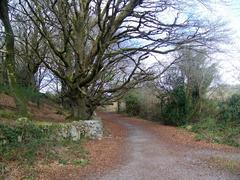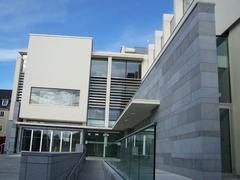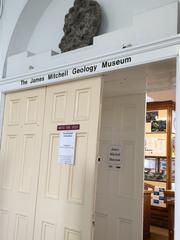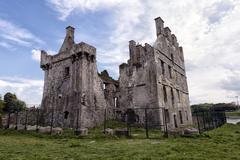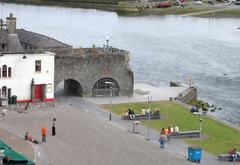City Hall Galway Visiting Hours, Tickets, and Historical Sites Guide
Date: 04/07/2025
Introduction
Galway City Hall, located in the heart of Galway, Republic of Ireland, stands as a testament to the city’s rich civic tradition and evolving governance. From its medieval roots with the Hall of the Red Earl, through centuries of change, to its current and future roles as the headquarters of Galway City Council, City Hall is central to the city’s culture, administration, and community life (thisisgalway.ie; Visit Galway).
Today, City Hall is more than just an administrative center; it fosters transparency, encourages public participation, and serves as a steward of Galway’s cultural legacy. It is a hub for city council meetings, public events, and the coordination of major festivals and heritage programs. The building is accessible to visitors who wish to observe local government in action or explore Galway’s civic heritage. The site is also within walking distance of several historical landmarks, offering a comprehensive journey through Galway’s layered history (Galway City Council; LGIU Interview).
This guide provides essential information for prospective visitors—including opening hours, ticketing, accessibility, highlights of architectural and civic significance, travel tips, and nearby attractions. Whether you are a history buff, a cultural traveler, or a Galway resident, this resource is designed to deepen your connection with the city’s story and vibrant community (Galway Tourism; RTÉ News).
Table of Contents
- Origins and Historical Development of Galway City Hall
- Architectural Features and Civic Significance
- Visiting Hours and Tickets
- Accessibility and Visitor Experience
- Nearby Historical Sites
- Frequently Asked Questions (FAQ)
- City Hall’s Role in Galway’s Future
- Tips for a Memorable Visit
- Cultural and Community Impact
- City Hall and Festivals
- Visual Resources
- Contact Information
Origins and Historical Development of Galway City Hall
The civic history of Galway dates back to the 13th century, when the Anglo-Norman De Burgo family established the walled town and built the Hall of the Red Earl, Galway’s first municipal building. This hall functioned as the center for city governance, judicial proceedings, and tax collection (thisisgalway.ie). Its strategic location near the Spanish Arch highlighted Galway’s importance as a trading hub.
Over the centuries, Galway’s municipal needs expanded, and the original hall eventually disappeared from daily use, only to be rediscovered through archaeological excavations in the late 20th century. The current City Hall, established in the mid-20th century on College Road, reflects the growth and modernization of Galway’s local government. Plans are underway for a move to a new, state-of-the-art facility at Crown Square by autumn 2026, symbolizing the city’s ongoing evolution (Galway City Council; RTÉ News).
Architectural Features and Civic Significance
The current City Hall emphasizes functionality, accessibility, and transparency, housing council chambers, administrative offices, and public service counters. The new headquarters at Crown Square will further enhance these features, providing energy-efficient design, step-free access, and improved facilities for civic engagement. The building is the nerve center for city decision-making, public consultations, and ceremonial events, such as the Freedom of the City (Galway City Council).
City Hall also plays a central role during major city events, including the annual St. Patrick’s Day parade and the Galway International Arts Festival (thisisgalway.ie).
Visiting Hours and Tickets
- Opening Hours: Monday to Friday, 9:00 AM – 5:00 PM. Closed on public holidays. It is advised to check the Galway City Council website for updates.
- Admission: Free. No tickets are required for general visits or to attend public council meetings.
- Council Meetings: Public council meetings are held monthly. Attendance is open to all without prior booking.
- Guided Tours: Not regularly available, but special open days and events occasionally offer guided access. Monitor the council’s website and local tourism platforms for announcements.
- Photography: Permitted in public areas, except during council meetings and in restricted spaces.
Accessibility and Visitor Experience
Galway City Hall is fully wheelchair accessible, equipped with ramps, elevators, and accessible restrooms. The new Crown Square facility will provide enhanced accessibility features, including step-free access, EV charging, and improved transport links. Staff are available to assist with visitor needs. Both English and Irish (Gaeilge) are used for signage and official documents, reflecting Galway’s bilingual heritage (Galway City Council).
Nearby Historical Sites
Enhance your visit by exploring Galway’s nearby historical attractions:
- Hall of the Red Earl: The excavated remains of Galway’s original town hall, complete with interpretive displays (thisisgalway.ie).
- Spanish Arch: A 16th-century extension of the medieval city walls, representing Galway’s maritime legacy (thelatinquarter.ie).
- Galway City Museum: Exhibits on the city’s history and civic institutions (touristplaces.guide).
- Lynch’s Castle: A fortified townhouse once home to one of Galway’s leading merchant families.
All of these sites are within walking distance of City Hall and offer a rich perspective on Galway’s development.
Frequently Asked Questions (FAQ)
Q: Are there any ticket costs to visit Galway City Hall?
A: No, admission is free.
Q: What are the City Hall visiting hours?
A: Monday to Friday, 9:00 AM – 5:00 PM. Check for public holiday exceptions.
Q: Can visitors attend council meetings?
A: Yes, council meetings are open to the public.
Q: Are guided tours available?
A: Occasionally, during open days or special events.
Q: Is City Hall accessible for people with disabilities?
A: Yes, with ramps, elevators, and accessible restrooms.
Q: Is photography allowed inside City Hall?
A: Yes, in public areas. Restrictions apply during meetings or in restricted zones.
City Hall’s Role in Galway’s Future
As Galway continues to grow, City Hall leads initiatives in sustainable development, cultural innovation, and community participation. The council’s vision includes promoting cultural sustainability, enhancing public spaces, and ensuring that Galway remains a welcoming city for all. The transition to the Crown Square headquarters reflects these ambitions, offering advanced facilities for governance and public engagement (Galway City Council).
Tips for a Memorable Visit
- Plan Ahead: Review council meeting schedules and public events on the Galway City Council website.
- Combine Visits: Visit nearby heritage sites like the Hall of the Red Earl and Spanish Arch.
- Attend Festivals: Time your trip with events such as the Galway International Arts Festival (County Galway Festivals).
- Explore Bilingual Culture: Engage with Galway’s Irish language resources (Creative Ireland).
- Accessibility Needs: Contact City Hall in advance for personalized assistance.
Cultural and Community Impact
Galway City Hall supports the city’s festivals, arts, and bilingual programs, playing a key role in Galway’s recognition as a UNESCO City of Film, European Region of Gastronomy, and European Capital of Culture (LGIU Interview). The council is instrumental in organizing major events and fostering the arts, community cohesion, and economic vitality (Galway City Council Arts Office).
City Hall and Festivals
Major events such as the Galway International Arts Festival, Galway Races, and the Christmas Market rely on City Hall for coordination and logistical support (Discover Ireland). During these periods, City Hall is bustling with activity, serving as both an organizer and participant in the city’s cultural life.
Visual Resources
Explore high-quality images and virtual tours of City Hall and nearby attractions on the Galway City Council website and Visit Galway. Interactive maps of Galway’s historic core can help you plan your route.
Contact Information
- Address: Galway City Hall, College Road / Crown Square, Galway City, Ireland
- Phone: +353 91 536400
- Website: Galway City Council
- Email: [email protected]
Summary and Call to Action
Galway City Hall bridges the city’s medieval roots and its future as a center of civic administration and cultural vitality. Free to visit and centrally located, City Hall offers a unique insight into local governance and community life. Combine your visit with nearby historical sites for a fuller appreciation of Galway’s story.
For guided tours and real-time updates, download the Audiala app, and stay connected through official channels and local tourism resources. Plan your trip to experience the depth and vibrancy of Galway’s civic and cultural landscape (Galway City Council; RTÉ News).
References
- Discover Galway City Hall: Visiting Hours, Tickets, and Nearby Historical Sites (thisisgalway.ie)
- Galway City Hall: Visiting Hours, Tickets, History & Nearby Attractions (Visit Galway)
- Galway City Council Official Website (Galway City Council)
- In Conversation with Brendan McGrath, Chief Executive of Galway City Council (LGIU Interview)
- Galway Ireland Travel Guide: Top Attractions, Festivals and Things to Do (thisisgalway.ie)
- History of Galway City and the Spanish Arch (thelatinquarter.ie)
- 10 Breathtaking Tourist Places to Visit in Galway (touristplaces.guide)
- Galway City Development Plan 2023-2029: Community and Culture Chapter (Galway City Council)
- Galway City Council Arts Office (Galway City Council)
- Creative Ireland Galway City Cultural Strategy (Creative Ireland)
- Galway City Hall Relocation Statement (Galway City Council)
- RTÉ News: Galway City Hall Transition (RTÉ News)
- County Galway Festivals and Events (County Galway Festivals)
- Discover Ireland: Festivals & Events Galway City (Discover Ireland)
